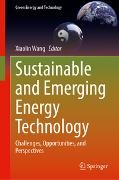Read more
Sustainable and Emerging Energy Technology: Challenges, Opportunities, and Perspectives presents advanced technologies and research results in theoretical, experimental, and practical sustainable and emerging energy engineering. Contributions cover theoretical analyses and case studies to explore new concepts, technological advancements, and practical applications to help engineers and researchers better understand the relevant concepts and solutions necessary to achieve global Sustainable Development Goals. The book brings together the latest developments in the emerging areas of renewable systems and technologies, green energy buildings, intelligent power systems, microgrids, energy storage, and security. Coverage includes:
- Renewable energy systems and applications;
- Power generation and efficiency;
- Power transmission, distribution, and control;
- Power grids and microgrids;
- Energy storage and conversion;
- Energy efficiency in conventional and renewable energy systems;
- Energy systems for buildings;
- Integration of renewable energy sources in buildings;
- Greening urbanization and urban settlements.
This book is a valuable resource o
List of contents
Ch 1: Research Progress on Improving Anaerobic Digestion Efficiency of Kitchen Waste in Biogas Power Generation.- Ch 2: Characterization and Simulation of the Biomass Pretreatment Procedures.- Ch 3: Sustainable Biomass Conversion to Biofuel: Recyclable Nanoporous Lignin-derived Cryogel Incorporated with H3PW12O40 - Nb2O5 for Levulinic Acid Production.- Ch 4: Application research of hydrogen production and water treatment based on photothermal catalyst.- Ch 5: Impact of Phase Change Materials on Temperature Regulation in Passive Cooling Systems.- Ch 6: Integrated Optimization of Staggered-Arranged Air-Cooled Battery Thermal Management Systems Using CFD and Evolutionary Algorithm.- Ch 7: Optimal Control of LNG-Fueled Hybrid Electric Ship.- Ch 8: Measuring the Efficiencies of Energy and Carbon Emissions for Metro Transportation Systems.- Ch 9: Impedance characterization and control switching of active distribution networks accounting for resistive components.- Ch 10: A Limited-data-based Power and Energy Demand Profile Modelling of an Electric Vehicle Fleet Charging Station.- Ch 11: High-Frequency Characteristics of Power Transformers: Analyzing the Impact on Harmonic Filtering Performance.- Ch 12: Modeling the Impact of Local Climate Projections on CO2 Emissions from Vegetation: Application on Five European Case Studies.- Ch 13: Exploring the Influence of Wind on Wildfire Behavior in China: A Data-Driven Study Using Machine Learning and Remote Sensing.- Ch 14: An AI-powered Simulation and Optimisation Framework for Energy Infrastructure Investment to Achieve Pareto Optimum Solutions.- Ch 15: Systematic Literature Review on Sustainable and Wildfire Risk Indicators in Biomass and Residual Biomass Supply Chain Optimization.- Ch 16: Energy System Optimisation for a Magnetite Iron Ore Processing Plant in Midwest Australia.
About the author
Xiaolin Wang, Ph.D., is a Professor in the School of Engineering, University of Tasmania. He worked as a Research Fellow in the Department of Mechanical Engineering at the National University of Singapore from 2002 to 2005. In 2003, he was a visiting scientist at the University of Siegen, Germany, funded by DAAD, Germany. In 2005, Prof. Wang joined the School of Mechanical and Chemical Engineering at the University of Western Australia. In 2012, he joined the School of Engineering, University of Tasmania, where he is now a Professor and Deputy Director of the Centre for Renewable Energy and Power Systems. His research interests include cooling and power engineering, energy storage and conversion, desalination, and utilization of renewable energy. Prof. Wang is a Fellow of Engineers Australia and was named a Field Leader in Thermal Science by The Australian’s Research Magazine in 2018. He is listed among the Stanford/Elsevier Top 2% Scientists in 2024. His national and international reputation in thermal science is evidenced by his achievements and awards, including the DAAD visiting fellowship by DAAD Germany in 2003 and the Ludwig Mond Prize 2005 by the Institute of Mechanical Engineers (IMechE), the Australian China Young Scientist Exchange Program award in 2009, and the Australian Japan Emerging Research Leader Program award in 2016 from the Australia Academy of Technological Sciences and Engineering (ATSE). He received the Dean’s Award for outstanding research performance in 2016 and the College Research Excellence Award in 2023 at the University of Tasmania and the Editor’s Choice Award from Applied Thermal Engineering. Prof. Wang is a subject editor of Applied Thermal Engineering, Associate Editor of the IMechE, Part E: Journal of Process Mechanical Engineering; Scientific Reports; and Frontiers in Built Environment, and Guest editor of Applied Sciences, Energies, Sustainability, and Thermo. He has completed many national/international research projects with a total value of around $7.5 million. He is also a member of the Blue Economic CRC ($329 million). To date, he has published more than 300 journal and conference papers.
Summary
Sustainable and Emerging Energy Technology: Challenges, Opportunities, and Perspectives presents advanced technologies and research results in theoretical, experimental, and practical sustainable and emerging energy engineering. Contributions cover theoretical analyses and case studies to explore new concepts, technological advancements, and practical applications to help engineers and researchers better understand the relevant concepts and solutions necessary to achieve global Sustainable Development Goals. The book brings together the latest developments in the emerging areas of renewable systems and technologies, green energy buildings, intelligent power systems, microgrids, energy storage, and security. Coverage includes:
- Renewable energy systems and applications;
- Power generation and efficiency;
- Power transmission, distribution, and control;
- Power grids and microgrids;
- Energy storage and conversion;
- Energy efficiency in conventional and renewable energy systems;
- Energy systems for buildings;
- Integration of renewable energy sources in buildings;
- Greening urbanization and urban settlements.
This book is a valuable resource offering practical approaches to help engineers and researchers in sustainable and emerging energy engineering technologies solve the problems affecting future communities.
- Analyzes sustainable energy technologies;
- Offers case studies examining technological advancements alongside practical applications;
- Examines the environmental impact of energy supply and management.

